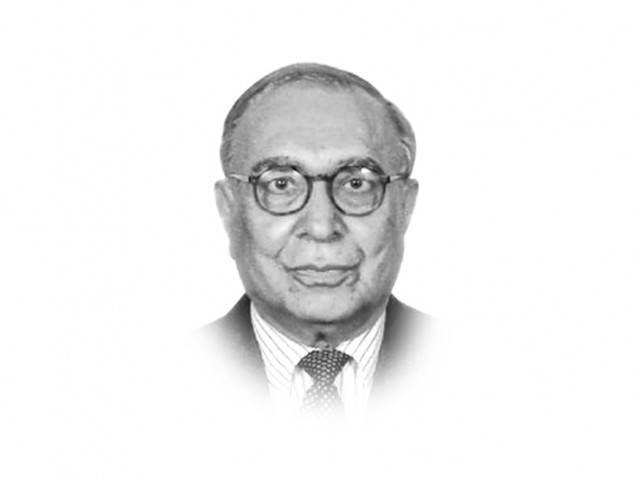Spotlight on the Fourth Estate
Given state of affairs in the country, perhaps SC should write media code of conduct, set the bar as high as possible.

Pakistan’s media derives its power and glory from the country’s chequered history. Spells of authoritarian rule worked against what the Czech playwright-president Vaclav Havel called the “plurality, diversity, independent self-constitution” of life ; parliaments, national civil bureaucracies, business associations, universities, platforms of creative pursuits , student bodies all succumbed to instruments of coercion. In an environment of fear, the media exhibited a special self-awareness that it was the only effective torch bearer of truth and that it represented a national tradition of trying to live up to a high calling. It was a long and lonely struggle that produced several larger-than-life figures. But then it was mostly before the world of media broke away from its old anchorage of anti-colonial and anti-authoritarian crusades and drifted into what the articles mentioned above visualise as the new domain of market forces.
It seems that this world could stand up to tyrants but lacked defence against the onslaught of money. By now, conversations in society tend to express despair about media in institutional terms while singling out heroic individuals who resist blandishments of lucre, especially of “hot” origin. When asked about decline in probity, integrity and style many practitioners do not disagree but deny personal responsibility and point their accusing finger to the demon called “ratings”. The procedure for working out ‘ratings’ is flawed and has gained traction largely because advertisers are complicit in it.
Any candid analysis of the state of media must begin with questions of ownership and that is what Mr Jabbar’s forceful argument is all about. Pakistan’s experience of state-controlled media establishments is that of loss of freedom, authenticity and credibility; it strengthened the case for the private sector to move in. The fundamental criterion for assessing the media remains the same. For the news media, Mr Jabbar formulates it to be public interest served by dispensing “fair, accurate, balanced, non-partisan content”. He advocates radical reforms in the ownership of news media that should be widely discussed even if prospects of either the present owners or any other pillar of state encouraging the process are dim. Sad as it is, one simply does not see parliament undertaking a serious interest in the project; it comprises political parties that have since the advent of private sector broadcasting worked overtime to exploit the new media for partisan purposes. A leading TV anchor recently spoke of widespread incidence of political affiliations in the electronic media, a trend on the increase as more and more money is invested by domestic and foreign lobbies in purchasing support for their agendas.
While a bold restructuring of ownership remains a distant, objective, there are aspects of the situation that should be redressed robustly. By now, the gap in incomes in the media world has assumed shocking proportions. While top salaries exceed financial remuneration in most other public and private enterprises, a large number of media workers continue to face what Mr Ziauddin describes as a “sweatshop environment”. It is difficult to see how excellence at the top can be achieved if there is a vast substratum of deprivation, disaffection and under-achievement. In fact, this disparity of rewards may well be one reason for increasing indifference to professionalism noticed in print and electronic outlets alike. It is a pity that old-fashioned trade unionism does not provide a remedy for it in Pakistan any more.
Barring honourable exceptions, TV channels often indulge in sheer venality. The talk shows that once shook the steel frame of General (retd) Pervez Musharraf have deteriorated into slanging matches in which no more than a dozen characters presumably groomed by the political parties for the job indulge in unprecedented slander. The anchors incite them and then ritually lose control of them. There cannot be a greater insult to the intelligence of the viewers. One of the many surprises brought by the rapid expansion of private television in Pakistan created a viewership that cut across social strata and underscored the universal hunger for information and participation in a society where limited literacy was a barrier to it being satisfied by the print media. This enthusiastic viewership is being betrayed every day through trivialisation of issues of great national significance. Even in fields like radio, TV and theatre where Pakistan had an edge in the region, there are first signs of deliberate vulgarisation justified with the great lie that this is what the “public” wants.
It is painful to hear from a journalist of impeccable integrity that some media houses have resisted codes of conduct and ethics for decades. It weakens the argument that the media world should write and enforce them. It does not, however, strengthen the case for the government to become the alternative arbiter. Given the state of affairs in the country, perhaps the Supreme Court should provide high-minded leadership and set the bar as high as possible. The Court will know that their work will take roots only if it is consonant with the thinking of those media men and women who have not sullied their hands and who are still the torchbearers of virtues enumerated by the three analysts I referred to with humility and respect.
Published in The Express Tribune, September 8th, 2012.















COMMENTS
Comments are moderated and generally will be posted if they are on-topic and not abusive.
For more information, please see our Comments FAQ